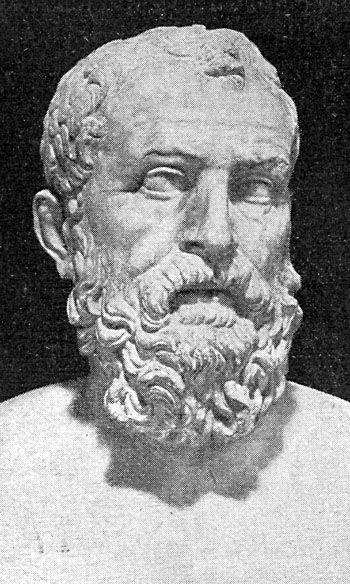Solon, statesman-poet and archon of ancient Athens, here plays off the image of Dike found in Hesiod’s Works and Days, but in such a way as to not only reflect but also bring about more progressive political norms. Where the penalty for unjust rulers in Hesiod’s passage was material desolation, and the reward only material prosperity, here the practice of justice in the city is the presence of justice in the city (l. 33-40), and the penalty for injustice is a “common evil”— namely that some members of the polis are deprived of their rights as citizens. This remarkably tangible appeal for justice is a remarkable progression from Hesiod’s remote and mythological vision. This focus on the immanent and concrete can be traced back to the lyric poets, in whose meter Solon writes. And in his conception on εὐνομία as not a personified goddess as much as an ideal political state Solon looks forward perhaps as far as Plato.
Joshua Anthony
Our city will never perish because of Zeus,
Or through the plans of the happy immortal gods—
For our guardian is great
of spirit: the one born of a mighty father,
Pallas Athena holds her hands over us.
But the very citizens plot to destroy this great city, 5
being dragged off by wealth in their folly.
The leaders of the people think unjustly, and
in their arrogance prepare to receive great pains:
For they do not know how to restrain themselves from excess,
or how to temper their present feasting in peaceful harmony, 10
But rather grow wealthy as they are persuaded of unjust deeds;
not sparing possessions sacred or civic, they steal,
snatching away left and right—
Nor do they heed the seeds
of the foundations of Justice
who, silently, knows what happens and what has been, 15
and comes, in time, always, avenging.
There comes a wound, unavoidable, presently, to every city,
which goes quickly into wretched slavery—
which awakens civil
discord, and sleeping war—
which destroys the lovely
youth of many— 20
for in meetings that are dear
to the unjust
a well-beloved city is swiftly laid waste by her enemies.
These evils then run among the citizenry: many of the needy
go into a foreign land, sold,
and bound with unseemly fetters, 25
and bear by force the shameful labors of slavery.
Thus this common evil enters every house,
nor are the outer doors still willing to hold it out.
It leaps a high fence, and even if a man should flee into the corner
of his inner chamber, by all means, it finds him. 30
These things my heart urges me to teach the Athenians:
how unsound governance gives greatest evils to a city,
sound governance shows everything orderly and suitable,
and often binds fetters around the unjust,
and levels off the unequal, arrests surfeit, tempers blazing arrogance, 35
withers the blooming flowers of ruin,
straightens crooked judgments, makes prideful deeds
to be mild, arrests the works of dissension,
stops the bile of torturous strife, and so it is that through it
everything concerning humans is made wise and harmonious.
ἡμετέρη δὲ πόλις κατὰ μὲν Διὸς οὔποτ᾽ ὀλεῖται
αἶσαν καὶ μακάρων θεῶν φρένας ἀθανάτων:
τοίη γὰρ μεγάθυμος ἐπίσκοπος ὀβριμοπάτρη
Παλλὰς Ἀθηναίη χεῖρας ὕπερθεν ἔχει:
αὐτοὶ δὲ φθείρειν μεγάλην πόλιν ἀφραδίῃσιν 5
ἀστοὶ Βούλονται χρήμασι πειθόμενοι,
δήμου θ᾽ ἡγεμόνων ἄδικος νόος, οἷσιν ἑτοῖμον
ὕβριος ἐκ μεγάλης ἄλγεα πολλὰ παθεῖν:
οὐ γὰρ ἐπίστανται κατέχειν κόρον οὐδὲ παρούσης
εὐφροσύνας κοσμεῖν δαιτὸς ἐν ἡσυχίῃ: 10
… πλουτοῦσιν δ᾽ ἀδίκοις ἔργμασι πειθόμενοι
… οὔθ᾽ ἱερῶν κτεάνων οὔτε τι δημοσίων
φειδόμενοι κλέπτουσιν ἐφ᾽ ἁρπαγῇ ἄλλοθεν ἄλλος
οὐδὲ φυλάσσονται σεμνὰ θέμεθλα Δίκης,
ἣ σιγῶσα σύνοιδε τὰ γιγνόμενα πρό τ᾽ ἐόντα, 15
τῷ δὲ χρόνῳ πάντως ἦλθ᾽ ἀποτεισομένη
τοῦτ᾽ ἤδη πάσῃ πόλει ἔρχεται ἕλκος ἄφυκτον:
εἰς δὲ κακὴν ταχέως ἤλυθε δουλοσύνην,
ἣ στάσιν ἔμφυλον πόλεμόν θ᾽ εὕδοντ᾽ ἐπεγείρει,
ὃς πολλῶν ἐρατὴν ὤλεσεν ἡλικίην: 20
ἐκ γὰρ δυσμενέων ταχέως πολυήρατον ἄστυ
τρύχεται ἐν συνόδοις τοῖς ἀδικοῦσι φίλαις.
ταῦτα μὲν ἐν δήμῳ στρέφεται κακά: τῶν δὲ πενιχρῶν
ἱκνοῦνται πολλοὶ γαῖαν ἐς ἀλλοδαπὴν
πραθέντες δεσμοῖσί τ᾽ ἀεικελίοισι δεθέντες, 25
καὶ κακὰ δουλοσύνης ἔργα φέρουσι Βία.
οὕτω δημόσιον κακὸν ἔρχεται οἴκαδ᾽ ἑκάστῳ,
αὔλειοι δ᾽ ἔτ᾽ ἔχειν οὐκ ἐθέλουσι θύραι,
ὑψηλὸν δ᾽ ὑπὲρ ἕρκος ὑπέρθορεν, εὗρε δὲ πάντως,
εἰ καί τις φεύγων ἐν μυχῷ ᾖ θαλάμου 30
ταῦτα διδάξαι θυμὸς Ἀθηναίους με κελεύει,
ὡς κακὰ πλεῖστα πόλει δυσνομία παρέχει,
εὐνομία δ᾽ εὔκοσμα καὶ ἄρτια πάντ᾽ ἀποφαίνει,
καὶ θαμὰ τοῖς ἀδίκοις ἀμφιτίθησι πέδας:
τραχέα λειαίνει, παύει κόρον, ὕβριν ἀμαυροῖ, 35
αὐαίνει δ᾽ ἄτης ἄνθεα φυόμενα,
εὐθύνει δὲ δίκας σκολιὰς ὑπερήφανά τ᾽ ἔργα
πραΰνει, παύει δ᾽ ἔργα διχοστασίης,
παύει δ᾽ ἀργαλέης ἔριδος χόλον, ἔστι δ᾽ ὑπ᾽ αὐτῆς
πάντα κατ᾽ ἀνθρώπους ἄρτια καὶ πινυτά. 40


No Comments